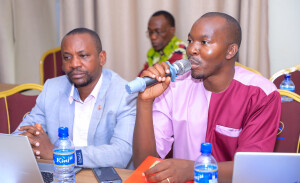
On 26th September 2023, VSF Belgium held the final workshop of the case study on CAHWs in Burundi, in collaboration with the Ministry of Livestock, Agriculture and Environment (MINEAGRIE). This case study was the third to be performed as part of the USAID/BHA-funded project that VSF International is jointly implementing with the World Organisation for Animal Health (WOAH).
During last July and August, field visits, focus group discussions and key informant interviews were conducted across the country by a team of national consultants. From the data collected, the consultants were able to draw the main strengths and weaknesses of current CAHW programs in Burundi.
Between the 1990’s and 2000s, the socio-political crises faced by Burundi headed to structural adjustments that led to the termination of veterinary nursing auxiliaries who were responsible for providing local animal health services in the communities. During the 2000s, the government and its technical and financial partners initiated livestock and agricultural development policies, hence increasing livestock numbers. However, animal health service provision was still weak.

In this context, the first CAHW programme was implemented in 2009 to fill the gap and provide the necessary animal health care to the animals distributed. Since then, several projects have been focusing on the training and deployment of CAHWs (World Bank/IFAD programs, NGOs initiatives, provincial veterinary services initiatives…) and a manual has even been developed in close collaboration with the Ministry of Livestock, Agriculture and Environment.
In Burundi, livestock is kept following the zero-grazing policy due to limited availability of land. Most livestock keepers are smallholders, with limited ability to pay for veterinary services. On the other hand, veterinary technical services face resources and transportation constraints to visit livestock keepers in rural areas.
CAHWs appear therefore as key service providers to these smallholders, but their sustainability faces several challenges, such as highly variable training (content, duration), weak supervision links with the local veterinary technicians, and low willingness to pay for services from livestock keepers.

Just like the final workshops of the other case studies in Niger and South Sudan, this workshop aimed at validating the study findings so that the recommendations drawn from the study could be scaled up at the national level. The first half of the workshop consisted in the presentation and discussion of main study findings, while the second half consisted in group works to validate lessons learned and discuss the possible way forward for improved animal health services in Burundi.
The workshop was attended by 39 participants, including key stakeholders from the central and decentralized veterinary services, the Veterinary Statutory Body, the line Ministry and technical partners.
Participants agreed on the need to move CAHWs’ institutional framework forward, to clarify and harmonize training, certification and supervision requirements and improve the quality of the much-needed services provided by CAHWs in poor rural areas of Burundi.

This article was made possible through support provided by the Bureau for Humanitarian Assistance, U.S. Agency for International Development, under the terms of Award No. 720BHA21IO00330 “Strengthening the enabling environment for Community Animal Health Workers (CAHWs) through development of competency and curricula guidelines”. This award is implemented by the World Organisation for Animal Health (WOAH, founded as OIE) in collaboration with Vétérinaires Sans Frontières International (VSF-Int). The opinions expressed in this article are those of the author(s) and do not necessarily reflect the views of the U.S. Agency for International Development.
